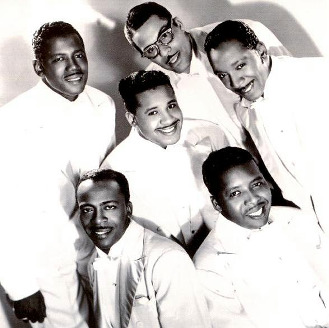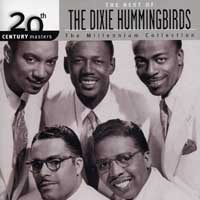
Dixie Hummingbirds


The Dixie Hummingbirds were formed in Greenville, South Carolina in 1928 by James B. Davis, who had a vision of a group of talented men who would commit to praising the Lord in song. They sang in unique, highly defined harmonies, in a style of music, which was termed "jubilee." They became the pioneers of the Gospel quartet sound that later would cross over into many genres of music, and are regarded as the greatest Southern quartet of their time. Some twenty men have come and gone with the group, yet Ira Tucker, Sr., their star vocalist, remains even today. He began with the group when he was in his early teens as a baritone marvel, and later began livening the concerts by leaving the stage and moving into the audience, rocking and reeling with the music, very much like the later evolving "soul music" performances. Paul Owens began his career as a "Bird", and he and Ira began a long partnership of amazingly intricate harmonies, thrilling packed houses everywhere they performed. Also joining the group was a young baritone prodigy, Willie Bobo. The group relocated to Philadelphia in the early forties, as their popularity began to grow.
They had a regular show over WCAU radio and a long term engagement at Cafe Society, a New York City night club, where they were billed as the Jericho Quartet. The Hummingbirds' popularity began to grow -- Tucker, in particular, wowed audiences with his flamboyant theatrics, rejecting the long tradition of "flat-footed" singers rooted in place on stage in favor of running up the aisles and rocking prayerfully on his knees. By 1944, he was even regularly jumping off stages -- indeed, the frenetic showmanship of soul music may have had its origins in Tucker's manic intensity, itself an emulation of country preaching. At the same time, the Hummingbirds' harmonies continued to grow more sophisticated; the addition of Paul Owens completed the quartet's development, and together he and Tucker honed a style they dubbed "trickeration," a kind of note-bending distinguished by sensual lyrical finesse and staggering vocal intricacy. Their virtuosity did not go unnoticed by audiences, and throughout the mid-1940s -- an acknowledged golden age of a cappella quartet singing -- the group regularly played to packed houses throughout the south.
 |
Love Me Like a Rock |
The unique, highly-defined harmonies that was called the "Jubilee" style of the Dixie Hummingbirds, made them pioneers of a Gospel quartet sound that became widely influential to many genres of music, including R&B, blues, Gospel, Pop and the Motown sound. Lead singer Ira Tucker, young baritone prodigy Willie Bobo, and a move to Philadelphia in the 1940s led to the growing popularity and legend of the "Birds," who continue performing, in various incarnations, to the present day, recording with Paul Simon and Stevie Wonder and earning Ebony Magazine's title of "Greatest Gospel Group," and a Grammy in 1973 for Best Soul Gospel Performance. The selections heard on this recording span three decades of the group work for the Peacock label, and a range of traditional, pre-war gospel numbers transformed into the group's highly original style, to contemporary songs written by the most famous 'Bird of them all Ira Tucker.
| 3023 CD $9.98 |
![]() Religious - Home | Contemporary Christian Groups | Christian CDs | Gospel Groups | Gospel CDs
Religious - Home | Contemporary Christian Groups | Christian CDs | Gospel Groups | Gospel CDs
Spirituals | Shape Note | Southern Gospel | Christmas | Christian Arrangements
Vocal Jazz | Choral | Contemporary | Barbershop | Christian | Collegiate | World | Doo Wop
Arrangements | Vintage Harmony | Budget titles | DVDs | Instructional for Singers
The Harmony Sweepstakes A Cappella Festival | West Coast A Cappella Summit
![]() RSS - New Releases
RSS - New Releases
To find a specific song on any recording (or to find recordings by group name or CD title),
pick the search method and type the item you are searching for here: